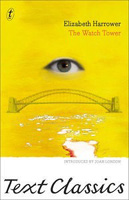 |
I had dinner recently with W.H. Chong, cover designer for Text Publishing, and he was extolling the virtues of a book that Text were about to re-issue in their Classics line. The book was The Watch Tower by Elizabeth Harrower. "Never heard of it," I said. He just looked at me like I was an idiot. I checked up on the author when I got home. And, yes, he was right, I really am an idiot. As the book is being distributed Gay Alcorn interviewed the author for "The Age": |
Harrower is 84, tall and straight-backed, dressed stylishly in black pants, black top and a neat neck scarf. Her fourth and last novel, The Watch Tower, was published in 1966. This month it was re-published as a Text Publishing Classic, one of 30 remarkable, and mostly out of print, Australian books. She is immensely pleased, having thought that nobody would again talk about Elizabeth Harrower, novelist, until she was dead.
..Harrower was close to Patrick White, in 1973 Australia's first winner of the Nobel prize for literature. She was friends with celebrated writers Christina Stead and Kylie Tennant and writer and political adviser Richard Hall. She was a close friend, too, of painter Sidney Nolan and his wife Cynthia. Her friends urged her to write, and were cross when she did not.
''Patrick was always very angry with me for not writing, enraged, he was horrible. Only people who really care about you care about whether you are doing that or not.'' She brings out a book White inscribed for her in 1986. ''To Elizabeth, luncher and diner extraordinaire. Sad you don't also WRITE.''
Over three hours, first at her apartment overlooking a glorious Sydney Harbour, then at lunch at a local restaurant in the inner city, Harrower tries to explain what happened. It is the first interview she has given for more than 20 years, and she talks about everything - and quizzes her interviewer in detail about all of life's doubts and joys - but she is reluctant to analyse her books and there are long pauses when she grapples with the question of why she stopped writing.
It's not as though she ran out of things to say - ''there were probably too many things to say''. It's not as though her work was poorly received - her second novel, The Long Prospect, was described as ranking ''second only to Voss as a post-war work of Australian literature''. It's not as though she was busy raising children - she never married and is childless. She doesn't dismiss the question as irrelevant, either. ''It's a very good question,'' she says.

Surely I didn't look at you like you were an idiot!? I may have been thinking of our egregious waiter at that point...
x ch'